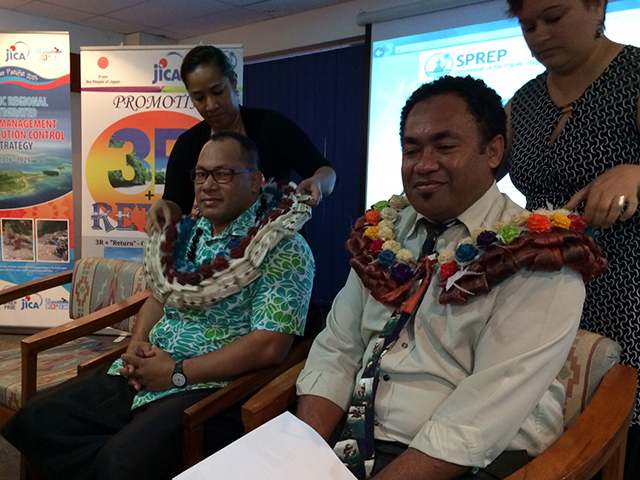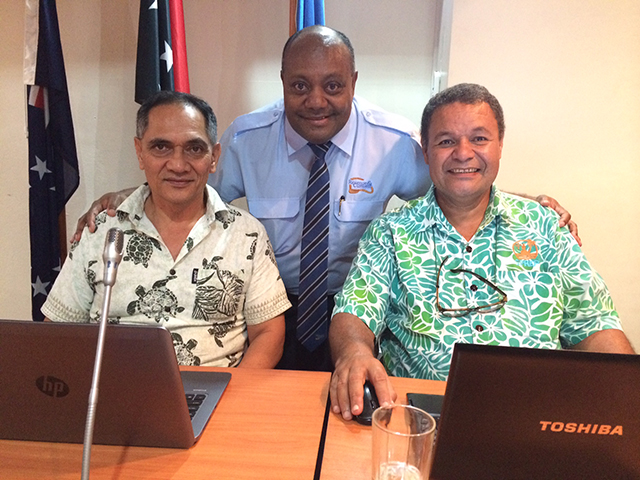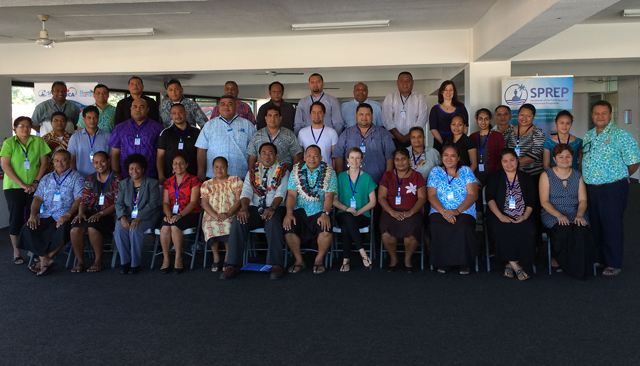
Waste Management and Pollution Control
20 July, 2015, Fiji – In Suva today, representatives from 16 Pacific island countries and territories have gathered to discuss and learn more about an important - but often overlooked - environmental agreement that has great significance to the Pacific region.
The treaty in question goes by the unwieldy formal name of The Pacific Regional Convention to Ban the Importation into Forum Island Countries of Hazardous and Radioactive Wastes and to Control the Trans-boundary Movement and Management of Hazardous Wastes. For obvious reasons, it's more commonly referred to as the Waigani Convention - named after Waigani, Papua New Guinea, which is where the Convention was adopted and first opened for signatures in 1995.
Back at this time, the world's largest ocean - the Pacific - was in genuine danger of becoming a dumping ground for hazardous and radioactive waste from unscrupulous waste traders. The impacts of these actions on our fragile marine ecosystems amounted to a potential environmental and human health crisis.
After the Convention came into force in 2001, signatories were obligated to ban the importation of hazardous and radioactive wastes. Importantly, the Convention also demanded that countries minimise the production of hazardous waste and cooperate to ensure that these materials are treated and disposed of in an environmentally sound manner - and as close to the source as possible. This 'stewardship' clause has provided an incentive for countries to establish national waste management and recycling programmes.
Today, despite a very different political and environmental landscape, the Convention is still just as pertinent to the countries and territories of the Pacific.
In his opening address to the meeting, the Deputy Director General of the Secretariat of the Pacific Regional Environment Programme (SPREP), Mr Kosi Latu, made reference to the current challenges that the region faces, especially with regard to toxic chemicals:

In the course of the four-day training, the management and transportation of hazardous chemicals is expected to be a hot topic of conversation. Dr Frank Griffin, Hazardous Waste Management Adviser at SPREP, explains the importance of this issue:
"Unlike inert solid waste, even small amounts of some chemicals can have a significant impact on human health and on the environment. There is also a growing awareness of toxic chemicals called Persistent Organic Pollutants, or POPs. These POPs can travel long distances through air and water, exposing people to serious health issues including cancer, birth defects and immune system impairments."

With little information available about existing stockpiles of toxic chemicals and POPs in the Pacific region, the scale of the problem is difficult to assess. Dr Griffin explains that SPREP is planning to run training across the region to assist Pacific island countries and territories to put together and manage chemical inventories:
"Once we have a clearer picture of what chemicals are being stored and transported, we will be able to regularly monitor the movement and management of these chemicals through the reporting mechanisms of the Waigani Convention. This is just another example of how the Waigani Convention serves to protect the Pacific environment and reduce risks to human health."
The Secretariat of the Pacific Regional Environment Programme (SPREP) serves as the Secretariat of the Waigani Convention, and the Pacific Islands Forum Secretariat (PIFS) serves as Depositary.

Attending the Waigani Convention Training are representatives from Cook Islands, Fiji, Federated States of Micronesia, Kiribati, Niue, Papua New Guinea, Samoa, Solomon Islands, Tonga, Tuvalu and Vanuatu who are Parties to the Convention. Also present are representatives from French Polynesia, Republic of the Marshall Islands, Nauru, New Caledonia, and Palau who are not Parties to the Convention, as well as representatives from PIFS.
The Waigani Convention Training is supported by the Pacific POPs Release Reduction project which is co-funded through the Global Environment Facility - Pacific Alliance for Sustainability (GEF-PAS) and Agence Française de Développement (AFD). It is executed by SPREP, in close cooperation with the United Nations Environment Programme (UNEP) and the Food and Agriculture Organization (FAO).
For more information about the Waigani Convention, please contact Dr Frank Griffin on [email protected]
The treaty in question goes by the unwieldy formal name of The Pacific Regional Convention to Ban the Importation into Forum Island Countries of Hazardous and Radioactive Wastes and to Control the Trans-boundary Movement and Management of Hazardous Wastes. For obvious reasons, it's more commonly referred to as the Waigani Convention - named after Waigani, Papua New Guinea, which is where the Convention was adopted and first opened for signatures in 1995.
Back at this time, the world's largest ocean - the Pacific - was in genuine danger of becoming a dumping ground for hazardous and radioactive waste from unscrupulous waste traders. The impacts of these actions on our fragile marine ecosystems amounted to a potential environmental and human health crisis.
After the Convention came into force in 2001, signatories were obligated to ban the importation of hazardous and radioactive wastes. Importantly, the Convention also demanded that countries minimise the production of hazardous waste and cooperate to ensure that these materials are treated and disposed of in an environmentally sound manner - and as close to the source as possible. This 'stewardship' clause has provided an incentive for countries to establish national waste management and recycling programmes.
Today, despite a very different political and environmental landscape, the Convention is still just as pertinent to the countries and territories of the Pacific.
In his opening address to the meeting, the Deputy Director General of the Secretariat of the Pacific Regional Environment Programme (SPREP), Mr Kosi Latu, made reference to the current challenges that the region faces, especially with regard to toxic chemicals:
"While chemicals can provide us with many benefits, they also create serious problems if they are not transported, stored or disposed of properly. We can end up with areas of land and water which are contaminated and pose a threat to our environment and the community. In the Pacific region, this is a huge issue because many of the islands we live on are very small and the water tables and waterways are fragile."

Mr Kosi Latu, Deputy Director General of SPREP, and Mr Aminiasi Qareqare, Acting Director of the Fiji Department of Environment, at the opening of the Waigani Convention Training in Suva. Photo: A.Carvan/SPREP
In the course of the four-day training, the management and transportation of hazardous chemicals is expected to be a hot topic of conversation. Dr Frank Griffin, Hazardous Waste Management Adviser at SPREP, explains the importance of this issue:
"Unlike inert solid waste, even small amounts of some chemicals can have a significant impact on human health and on the environment. There is also a growing awareness of toxic chemicals called Persistent Organic Pollutants, or POPs. These POPs can travel long distances through air and water, exposing people to serious health issues including cancer, birth defects and immune system impairments."

(Left to right), SPREP Legal Adviser Mr Clark Peteru, Mr Josevata Qalubau from Fiji Revenue and Customs Authority, and SPREP Hazardous Waste Management Adviser Dr Frank Griffin at the Waigani Convention Training in Suva. Photo: A.Carvan/SPREP
With little information available about existing stockpiles of toxic chemicals and POPs in the Pacific region, the scale of the problem is difficult to assess. Dr Griffin explains that SPREP is planning to run training across the region to assist Pacific island countries and territories to put together and manage chemical inventories:
"Once we have a clearer picture of what chemicals are being stored and transported, we will be able to regularly monitor the movement and management of these chemicals through the reporting mechanisms of the Waigani Convention. This is just another example of how the Waigani Convention serves to protect the Pacific environment and reduce risks to human health."
The Secretariat of the Pacific Regional Environment Programme (SPREP) serves as the Secretariat of the Waigani Convention, and the Pacific Islands Forum Secretariat (PIFS) serves as Depositary.

Attending the Waigani Convention Training are representatives from Cook Islands, Fiji, Federated States of Micronesia, Kiribati, Niue, Papua New Guinea, Samoa, Solomon Islands, Tonga, Tuvalu and Vanuatu who are Parties to the Convention. Also present are representatives from French Polynesia, Republic of the Marshall Islands, Nauru, New Caledonia, and Palau who are not Parties to the Convention, as well as representatives from PIFS.
The Waigani Convention Training is supported by the Pacific POPs Release Reduction project which is co-funded through the Global Environment Facility - Pacific Alliance for Sustainability (GEF-PAS) and Agence Française de Développement (AFD). It is executed by SPREP, in close cooperation with the United Nations Environment Programme (UNEP) and the Food and Agriculture Organization (FAO).
For more information about the Waigani Convention, please contact Dr Frank Griffin on [email protected]